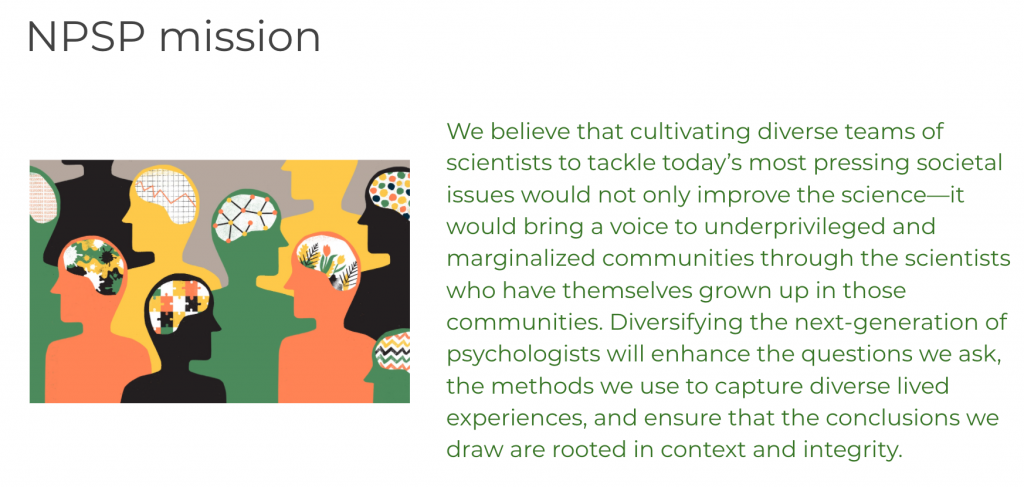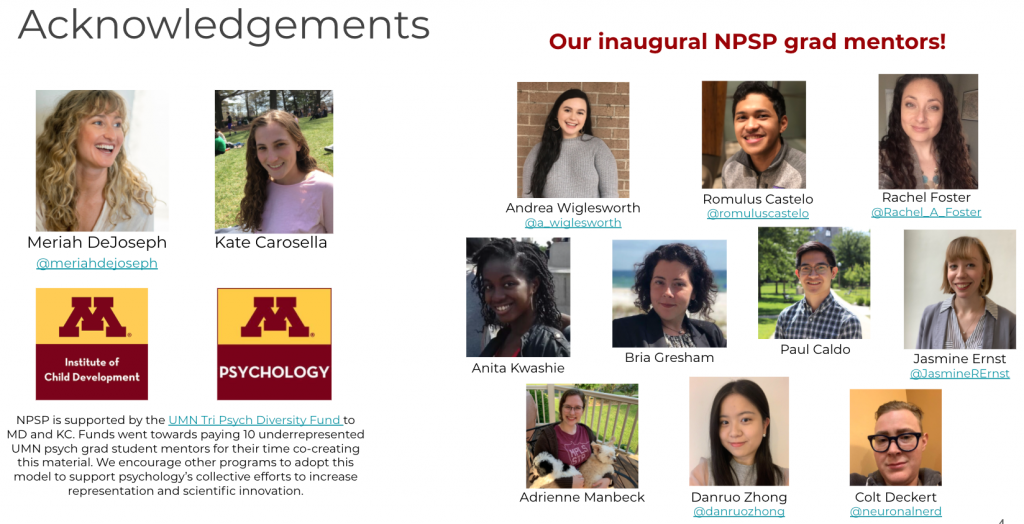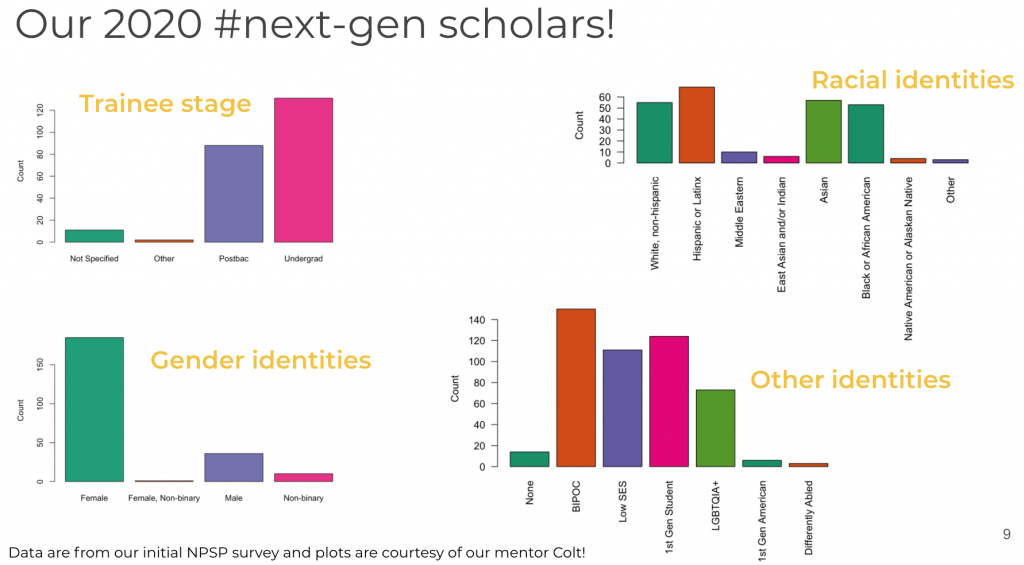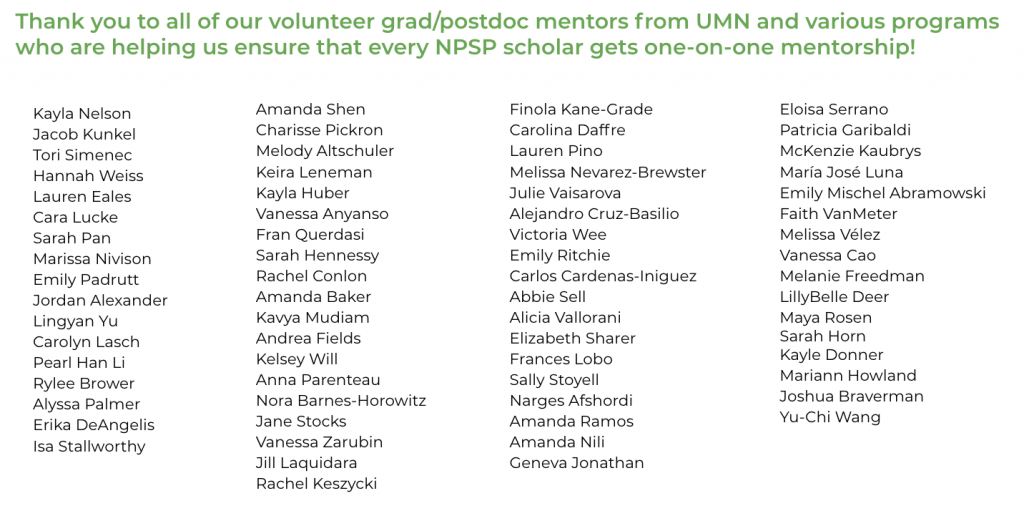Below is a summary outlining the goals and the motivations behind the Next Gen Psych Scholars Program, as well as an overview of how we created it and what’s to come.
Click here for a link to the NPSP google drive including a comprehensive slide deck of resources and folders containing example statements, email templates, and CVs.
Overview of the program
The Next-Gen Psych Scholars Program (NPSP) is a virtual graduate student-led mentorship program for underrepresented (i.e. BIPOC, low-income, first-gen, LGBTQIA+) undergraduates and post-baccalaureates interested in applying to psychology PhD programs.
The goal of NPSP is to cultivate long-term support structures between current underrepresented graduate students and diverse undergrad or post-baccalaureate mentees to (1) embrace and celebrate the unique journeys that have led current graduate students to pursue a PhD and (2) inspire and empower the next generation of scholars while enhancing feelings of belonging in academia. Although the process of applying to graduate school is outlined, we spend a significant amount of time discussing how to both challenge and navigate the “hidden curriculum” (e.g., networking, advocating for yourself, asking for help) of academia as well as the hardships experienced by underrepresented students.
The program consists of a 3-hour information session (including a grad panel and a 30 min faculty panel on the admissions process) followed by ongoing communication and connection over Slack. In small group and one-on-one mentorship throughout the year, mentees are also paired with current graduate students to discuss their grad school plans, workshop any application materials, and provide individual-level support upon request. As a show of appreciation for graduate students’ time and to honor the diverse perspectives they share with mentees, 10 graduate students are paid a consulting fee of $100 thanks to the generous support from the University of Minnesota (UMN) Tri Psych Diversity Fund.

Motivations behind the creation of NPSP
Like many low-income first-gen students, I had a difficult time navigating higher education. Once I finally figured out what a PhD even meant and that it’s what I wanted to pursue, I had no clue what I needed to do to get in. However, I knew that I had to find a way to compensate for multiple weaknesses on my application stemming from common challenges first-gen students experience. I was embarrassed about these weaknesses and therefore avoided putting myself out there to get the guidance I really needed from my mentors until much later. I felt alone and often questioned whether I had any business continuing this pursuit. A program like NPSP would have minimized the time, debt, and heartache it took me to figure out how to make myself competitive enough to get in.
It was my faculty and peer mentors–especially those I met at NYU while working as a post-bacc lab manager–that invested in my success and taught me the importance of advocating for yourself. This was the kind of mentorship I wish I had received much earlier; the kind that also validated the very real challenges that not only low-income first-gen students face, but academics of color and LGBTQIA+, in the path towards a PhD. Since obtaining the privilege of becoming a PhD student, I’ve tried to be more open about my path with the first-gen undergrad students I mentor and have led small panels of trainees from various backgrounds who are asked to share their stories. The goal of sharing their stories is to inspire and motivate aspiring PhD students who might resonate with them, reducing feelings of being alone in their struggles while also obtaining the knowledge to succeed in this field.
Psychology is so focused on the importance of context, yet when it comes to the scientists themselves, the contexts they grow up in and the identities/lived experiences that influence their approach to science and mentorship are rarely discussed. Connecting with the next-generation of psych scholars on a more human level may be a necessary first step towards diversifying academia from the bottom-up. From personal experience, I found that such connections are formed most easily among peers/trainees who can provide mentorship that inherently feels less intimidating. NPSP adopts this peer-to-peer mentorship model using a strengths-based approach, with a focus on celebrating diversity and normalizing setbacks to foster belongingness.
How the co-creation process unfolded thanks to an army of grad students
Over the summer, UMN’s Tri Psych Committee (representing ICD, Psych, and Ed Psych depts) announced a call for grad-student led proposals for DEI initiatives across departments. This was a meaningful action from our departments in response to the death of George Floyd, in addition to the longstanding student demands for greater efforts towards increasing diversity in our programs. In September, myself and two other grad students representing our three psychology DEI committees hosted a virtual happy hour so that grad students across departments could brainstorm potential proposal ideas (since a requirement was for cross-departmental collaboration). I didn’t really know any grad students from the other departments so I was fortunate to meet Kate Carosella in this meeting, a first-year clinical student who also expressed interest in pursuing efforts at the undergrad level. Kate was immediately on board for the idea for NPSP, and we received notice of the $1000 award mid-October. This gave us less than a month to launch the program in order to make it worthwhile for students applying this cycle.
We had no idea how time intensive launching NPSP would be. Although I had an overall vision for the program and had already developed a lot of predoc content for my previous mentees as well as mini versions of what NPSP is now, the content and the scale of the program became so much bigger than I had anticipated.
As soon as we received the news for funding, Kate and I quickly recruited our 10 underrepresented grad student mentors from ICD and Psychology who served as our paid consultants. Together, they brought in rich perspectives across multiple intersecting identities (BIPOC, first-gen, low-income, LGBTQIA+, international) and offered their quotes, stories, and example app materials to co-create the NPSP content consisting of endless resources and a large slide deck with an overview of the application process and aspects of the hidden curriculum. On the day of the 3-hour panel, these grad students are asked a series of questions that require reflections on their journey to this point and the ways they have navigated academia. As a team, we discussed whether and how we wanted to make the content publicly available, given that many of our quotes, stories, and identities are visibly shared throughout. We ultimately left it up to individuals to decide which content they felt more comfortable anonymizing before making public. Most mentors decided to maintain their identities and share with some discretion, so as to demonstrate NPSP’s aim of embracing and celebrating the stories of underrepresented students.

Recruitment for underrepresented undergrads and post-bacc mentees happened over the course of two weeks, with a final count of 255–WAY more than we ever imagined. These students came from schools all around the U.S. and identified as being a member of multiple groups historically underrepresented in psychology. If this is any indication of the makeup of future psychologists, then the future looks bright as long as we can support these scholars in the ways necessary to retain them.

In an attempt to match up as many mentees with one-on-one mentorship as possible, we decided to put out a public call for additional volunteer mentors from various programs. We were immensely fortunate to get over 70 trainees (grad and postdoc) sign up! These additional mentors do not participate in the information/panel session but are asked to commit to at least one 30 min one-one Zoom session with a mentee afterward and are invited to coordinate optional future grad student panels. In making the mentor-mentee matches, we aimed to pair mentees with grad students/postdocs who share similar identities to the ones that they identify with, with the idea that shared lived experiences may foster greater rapport and support. All of these pairings around this process took multiple surveys and behind the scenes organization that Kate was particularly paramount in.

What’s next for next-gen
A primary goal of NPSP is to cultivate long-term peer support networks focused on underrepresented students (but still inclusive for all trainees from all backgrounds), so continued dialogue, support, and mentorship will be provided within Slack indefinitely. In addition, we plan to schedule smaller grad mentor-led panels throughout the year that focus on professional development topics or informal panel discussions where grad students will simply share how they got to where they are now. We are also encouraging our mentees to create accountability groups to work on apps together, and journal clubs to discuss articles they are interested in (one of which has already been started by a mentee!). Collectively, we hope that these spaces provide a safe, open, and supportive environment where trainees across multiple levels and backgrounds can lift one another up as we all navigate academia together.
One of my biggest dreams for NPSP is to see it continue to grow in collaboration with multiple psychology departments around the United States. I think programs like NPSP are the most impactful when led by underrepresented grad students, but because of that, they should be compensated for their time. There is a strong case to be made about the potential for NPSP to increase diversity in psych PhD programs broadly, which thus has the potential to enhance and innovate our science and the impact we aim to make. My hope would be to see similar funding mechanisms to the UMN Tri Psych Diversity Awards across multiple psych programs so that we can all pool our funds and compensate as many underrepresented grad students as possible next year and in future years.
Since the program infrastructure and content is already done, incoming paid grad mentors would dedicate their consulting time to overseeing the Slack, providing one-on-one or small group mentorship sessions, and lead the 3-hour info session next fall. The more grad mentors we have in future years the better, as we anticipate the number of participants may increase. If you’re reading this and want to spearhead these efforts in your program, please connect with me!